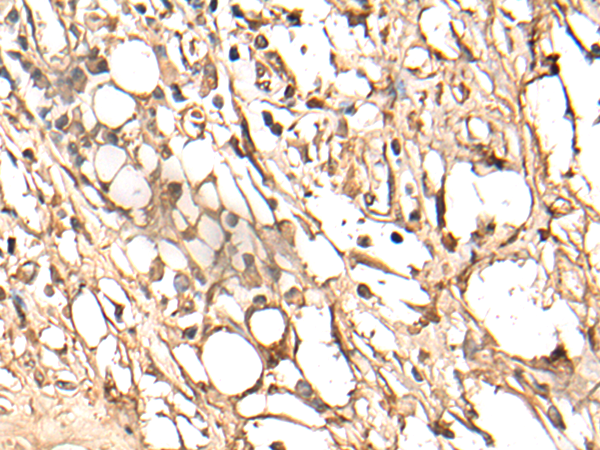
| WB | 咨询技术 | Human,Mouse,Rat |
| IF | 咨询技术 | Human,Mouse,Rat |
| IHC | 1/25-1/100 | Human,Mouse,Rat |
| ICC | 技术咨询 | Human,Mouse,Rat |
| FCM | 咨询技术 | Human,Mouse,Rat |
| Elisa | 1/5000-1/10000 | Human,Mouse,Rat |
| Aliases | MRP4; MOATB; MOAT-B |
| Host/Isotype | Rabbit IgG |
| Antibody Type | Primary antibody |
| Storage | Store at 4°C short term. Aliquot and store at -20°C long term. Avoid freeze/thaw cycles. |
| Species Reactivity | Human |
| Immunogen | Synthetic peptide of human ABCC4 |
| Formulation | Purified antibody in PBS with 0.05% sodium azide and 50% glycerol. |
+ +
以下是关于ABCC4抗体的3篇参考文献及其摘要概括:
---
1. **文献名称**: "Characterization of monoclonal antibodies specific for human multidrug resistance protein 4 (MRP4/ABCC4)"
**作者**: T. Fukuda et al.
**摘要**: 该研究开发并验证了针对人ABCC4蛋白的单克隆抗体,通过免疫印迹和免疫组化确认其特异性,并发现ABCC4在血小板和某些肿瘤细胞中高表达,可能与药物外排功能相关。
---
2. **文献名称**: "Expression and localization of ABCC4 in human pancreatic ductal adenocarcinoma"
**作者**: S. Yonezawa et al.
**摘要**: 利用特异性抗体检测ABCC4在胰腺癌组织中的表达,发现其高表达与化疗耐药性及患者预后不良相关,提示ABCC4可能作为胰腺癌治疗的潜在靶点。
---
3. **文献名称**: "Role of ABCC4 mutations in resistance to anticancer nucleoside drugs"
**作者**: M. Malofeeva et al.
**摘要**: 通过抗体验证ABCC4在癌细胞膜上的定位,证明其突变导致核苷类似物类药物(如吉西他滨)的外排能力改变,从而影响化疗效果。
---
(如需更多文献,可补充搜索关键词如“ABCC4 antibody validation”或“MRP4 immunohistochemistry”。)
The ABCC4 antibody is a crucial tool for studying the ATP-binding cassette (ABC) transporter subfamily C member 4 (ABCC4), also known as multidrug resistance protein 4 (MRP4). ABCC4 is a transmembrane protein that actively transports a wide range of endogenous and exogenous molecules, including cyclic nucleotides (cAMP, cGMP), prostaglandins, antiviral drugs, and chemotherapeutic agents. It plays a vital role in cellular detoxification, drug resistance, and the regulation of signaling pathways by effluxing substrates across cell membranes. ABCC4 is expressed in various tissues, such as the liver, kidneys, prostate, and blood-brain barrier, where it influences drug pharmacokinetics and tissue-specific homeostasis.
Antibodies targeting ABCC4 are widely used in biomedical research to investigate its expression patterns, subcellular localization, and functional roles in health and disease. For example, ABCC4 overexpression has been linked to chemoresistance in cancers (e.g., prostate cancer, leukemia), as it reduces intracellular drug accumulation. Additionally, ABCC4 polymorphisms or dysregulation are associated with cardiovascular diseases, inflammatory conditions, and neurological disorders. Researchers employ ABCC4 antibodies in techniques like Western blotting, immunohistochemistry, and flow cytometry to validate protein levels in experimental models or clinical samples.
The development of specific and high-affinity ABCC4 antibodies has advanced studies on its interaction with therapeutic agents, aiding in the design of strategies to overcome drug resistance or modulate transporter activity for improved treatment outcomes.
×